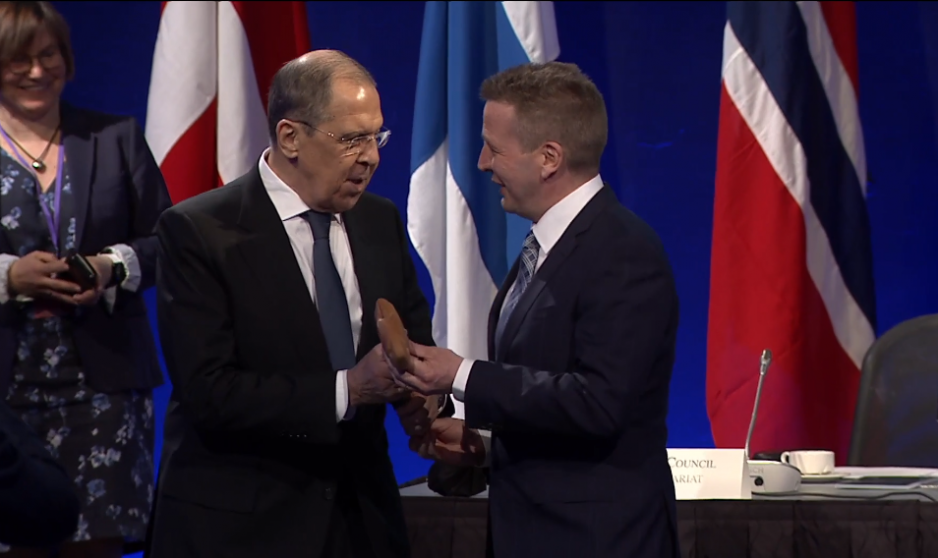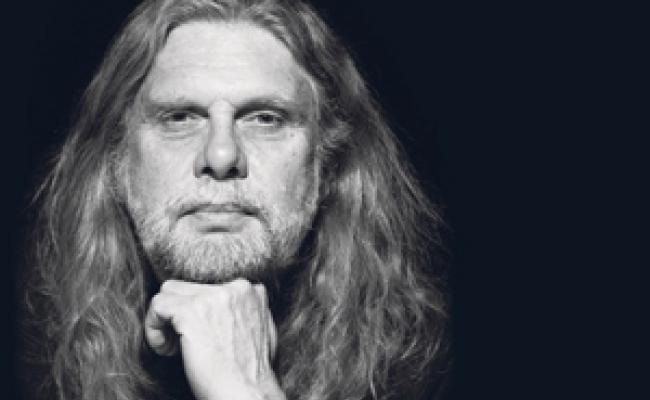The Arctic is Our Home

This week, Russia assumed the chairmanship of the Arctic Council after Iceland. Russian Foreign Minister Sergey Lavrov took over the gavel from Icelandic Foreign Minister Gudlaugur Thór Thórdarson. (Photo: Screenshot from the Arctic Council)
Commentary: Following an unsuccessful attempt at torpedoing international cooperation in the High North, the USA is back on track in the Arctic Council. Not even the Russian foreign minister’s repeated insistence on bringing security issues onto the Council’s table could stifle a rather euphoric summit in Reykjavik, Iceland on Thursday.
In Norway, the international significance of the Arctic policy has gradually been pushed into the background to the benefit of a more domestic policy approach to the issue. The most concrete expression of such a shift is the fact that shaping the policy went from being owned by the Ministry of Foreign Affairs to being shared between the MFA and the Ministry of Local Government and Modernization, as evident in the recent whitepaper on the High North presented in November last year.
Our own expectations
Our own expectations to the content of the Arctic policy have also contributed to such a shift. In the four-year perspective of politics – the time between parliamentary elections – most political initiatives are judged by the money that accompanies them.
There are both good and bad reasons for such a gradual expansion, or dilution, if you prefer, of the term.
The good arguments are about how Norwegian foreign and security politics in the Arctic rely on a robust population. On the other hand, strengthening the domestic policy dimension makes the Arctic policy less precise and more like any other political initiative or strategy, and through that also harder to legitimize through purely strategic arguments.
A rather euphoric summit at the Arctic Council
This dual book-keeping, necessary as it may be, was also expressed during the Arctic Council summit in Reykjavik this week. Clearest, and perhaps most unexpected, from US Secretary of State Antony Blinken.
“The Arctic is not just a strategic region. It is our home”, Blinken reminded his seven other Arctic counterparts.
Sensational
Rather sensational, as quite few Americans would recognize such a description. Their relationship to Alaska, which makes the USA an Arctic state, is almost non-existent. Even more thought-provoking as Blinken in stating this assumes a position when it comes to the Arctic Council that is directly opposite to his Trumpian predecessor Mike Pompeo. In the world of Pompeo, the Arctic was all about security politics, in addition to a planned looting of resources in the Arctic.
But if there from a Norwegian perspective has been an expansion of the term “High North”, the Norwegian version nevertheless still rests on the strategic dimension. In 2005, the then-Stoltenberg government used the phrase “Norway’s most important strategic initiative area in the coming years”.
The Solberg government’s whitepaper on the High North from last year reads: “The Government has defined the High North as Norway’s most important strategic area of responsibility.”
These phrases are 16 years apart, yet the main message is the same.
Security politics
If I am to judge by the media attention following the Arctic Council summit in Iceland, and the Corona situation made allowed very few journalists to be present, the meeting was primarily about the Russian foreign minister’s desire to bring security politics onto the table at the Arctic Council. Sergey Lavrov was even slightly annoyed as he repeatedly had to answer similar questions about this.
I am not quite sure what Lavrov’s real message was; whether he actually wants to bring security politics issues in to the Arctic Council, or whether he wants to use the Russian chairmanship of the Arctic Council for the next two years to also take security policy initiatives outside the framework of the Arctic Council.
In both cases, he will face opposition from the other Arctic states. There is no way of bringing security politics to the Arctic Council table, and it is clearly not an option for Norway and the USA to allow military high-lever leaders meet with their Russian counterparts, as suggested by Lavrov.
Wanting more dialogue is less of a problem
The disagreement about the latter runs deep in the Norwegian armed forces. Many have been open to such dialogues, yet have also wisely stated that this is a political decision they will not interfere with.
Military arms race
Lavrov’s initiative, which was well known beforehand, will nevertheless not cause any problems for cooperation in the Arctic Council. Wanting more dialogue, in keeping with Russia’s strategic interest, is less of a problem than for instance the USA’s attempt at sabotaging dialogue about climate issues at the previous AC Ministerial Meeting two years ago.
Because as seven Arctic foreign ministers promised their Russian colleague peaceful and constructive cooperation during the Russian chairmanship, the militarization of the Arctic increases.
Norway is part of this military arms race too.
Which is why the USA’s reminder that the Arctic is a home, not just a strategic region is worth noting for future Arctic cooperation.
Also read
This commentary was originally published in Norwegian and has been translated by HNN's Elisabeth Bergquist.



